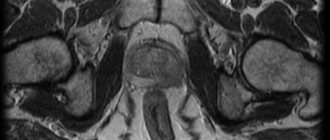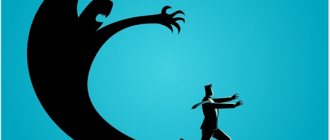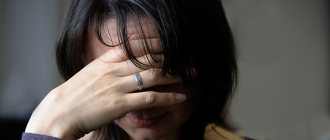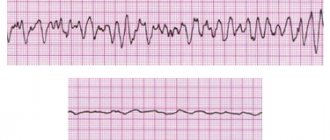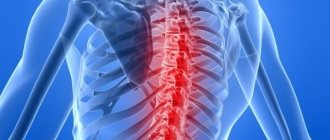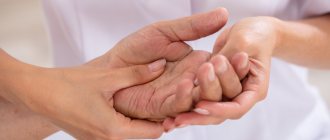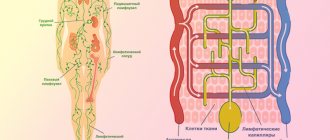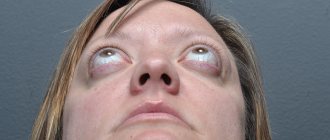Insomnia is a sleep disorder that is one of the most common. The medical term for insomnia is insomnia.
A person needs to sleep 7-8 hours a day. At the same time, the normal biological rhythm assumes that we sleep at night (in the dark) and are awake during the day. Life is structured in such a way that we still have to stay awake during the day (work, errands, etc.). And if we fail to get enough sleep at night, our performance decreases. First of all, intellectual abilities suffer. Trouble concentrating may occur, making the person vulnerable to accidents and injuries. Chronic insomnia is especially dangerous. In this case, the person becomes irritable and nervous, there is a general deterioration in health, immunity decreases, and memory deteriorates.
Insomnia
Typically, insomnia refers to the lack of sleep during that period of the night that a person reserves for sleep. There is an intention to fall asleep, but sleep deceives and does not come. From a medical point of view, the concept of insomnia is broader - it is not just insufficient duration , but also inadequate quality of sleep . If a person sleeps, but often wakes up during the night and ultimately does not get enough sleep, this is also insomnia. Another type of insomnia is difficulty falling asleep . Normally, a person falls asleep in the interval from 3 to 15 minutes. With insomnia, the process of falling asleep can take up to 2 hours or more. Waking up too early
also considered as a variant of insomnia: a person wakes up before the right time and can no longer fall asleep.
Manifestations of insomnia also include post-somnia disorders : if a person, after a night spent in bed, feels sleep-deprived, feels tired, weak, lethargic, this also indicates that his sleep is disturbed.
Prevention of insomnia: how to avoid insomnia
By following these sleep hygiene rules , you will speed up the process of falling asleep and ensure higher quality sleep:
Sleep hygiene
- Ensure the bedroom is darkened and soundproofed. If sound insulation is poor, use earplugs or a white noise generator. Lowered curtains will protect you from early sunlight and light flashes on the street. When waking up, on the contrary, you need to raise the curtains or turn on the light - this will give your body vigor;
- optimize the temperature regime. The best air temperature for sleeping is 15.5-18.3°C. The air should be fresh, so try to leave the window open. In winter, slot ventilation is suitable;
- the bed should be comfortable, the mattress should be thick enough, the blanket should not be too hot;
- Don't drink alcohol in the evening. It will ruin your sleep;
- Don't drink coffee in the afternoon. Caffeine is eliminated from the body within 12 hours or more;
- do not overeat at night;
- Organize your bedtime so that you take a bath 1-2 hours before you go to bed. An evening bath helps relax muscles and is therefore good for sleep; but the procedure itself is stimulating, and if you go to bed straight from the bath, it may be difficult to fall asleep;
- don't smoke in bed;
- lead an active lifestyle; do exercises; take a walk in the fresh air. The greatest activity should occur in the first half of the day. In the evening, before going to bed, it is useful to take a walk so that you feel moderate physical fatigue;
- do not sleep during the day, especially after 4 pm;
- learn to relax. Find your own way to relieve emotional stress. “Counting sheep” is not recommended: counting requires concentration, and concentration interferes with sleep;
- take care of your health. Pain caused by a chronic disease, as a rule, reminds itself at night, receding into the background during the day. It’s worth doing it as soon as possible; among other things, it will return the quality of your sleep.
What is insomnia
Insomnia, or in medical language - insomnia, is considered to be any deviation from normal sleep. Frequent awakenings in the middle of the night, prolonged (up to several hours) falling asleep and difficult awakenings, prolonged absence of sleep at night, shallow sleep - all this is considered to be manifestations of insomnia. Everyone has had periods in their life when they experienced the effects of insomnia on themselves. She especially likes to come before an important event, on the eve of a celebration or exam, when a person is making an important decision in life, to young mothers who hear the slightest rustle of the baby.
More often than not, insomnia is a byproduct of our nervous system, which is known to be unstable, especially in today's pace and lifestyle. The disease can have several types of manifestation.
Presomnia type of disorder
Characterized by prolonged falling asleep. At this time, a person experiences a physical need for rest, feels the desire to fall asleep, but cannot do this. The norm for falling asleep is 5-15 minutes. If after this time sleep has not occurred, we can talk about manifestations of insomnia. This is usually associated with neuropsychological disorders and occurs on the eve of exciting events or after important events. It occurs very often and usually goes away on its own as the emotional state improves.
Intrasomnic disorders
With this type of insomnia, sudden awakenings at night occur, followed by difficulty falling asleep or a complete lack of further sleep. This type of disorder makes sleep superficial, reminiscent of a normal nap and sensitive, when the sleeper is able to wake up from the slightest rustle. Insomnia in this case is caused by emotional swings, experiencing unpleasant events, mental disorders, sleep apnea and self-snoring, systemic diseases (thyroid gland, diabetes mellitus).
Postsomnia disorders
This type is even more common than the first. Its main symptom is a lack of strength and desire to open your eyes, a long awakening, weakness and fatigue even after a whole night of restful sleep. A person suffering from this type of insomnia feels drowsy throughout the day and fails when trying to replenish energy and fall asleep. In addition to psychological reasons, in this case there may be a deficiency of vitamins and minerals, late going to bed, blues and emotional stress. Usually, with this disorder, a person easily falls asleep and sleeps soundly at night, but waking up in the morning causes negative emotions and physical impotence.
But before diagnosing insomnia, it is worth assessing your habits, current state of affairs, and emotional state. Often the reason may lie on the surface.
Tablet in hand
When Lyubov Lvovna believed in the diagnosis of depression, she began to see a doctor as a day patient. She recalls: “When the doctor heard my story, he said to me: “How are you holding up? Any healthy man would have collapsed already. You must be very strong.” I deceived the doctor: I took a smaller dose of pills. I gained a lot of weight on this antidepressant and was afraid of gaining even more weight. But at least she started sleeping, and there was no ambulance for six months. I worked on pills, there were concerts. When I came to work, they told me: “My God, what bruises you have under your eyes, how can you still walk.” I can’t say this: I’m getting completely scared, it seems to me that I’m dying.”
“The process of selecting medications is simple,” recalls Olga Moiseeva about her treatment of insomnia. — Doctors have a list of drugs that are used for insomnia (but only for acute insomnia, which does not last long). These drugs are the same for everyone. Some are just weaker, others are stronger. Doctors begin to get confused when the patient says that they have tried everything and there is no point. None of them should be taken for more than a month, and all pills have withdrawal symptoms. They offered sports as an alternative to pills, but it didn’t help me. I worked out two or three times a week, but sleep didn’t always come after training. That is, it turned out that after a sleepless night I went to work, and then to fitness, and I really risked my heart at such moments. My coach told me that I can’t do this. I was also offered cognitive behavioral therapy. But, having found out the price for the session, I was forced to refuse: no guarantees were given, and the price tag for the course was equal to my salary.
Collage: Anna Lukyanova
All the doctors, such as a neurologist, a somnologist, a psychotherapist, cost me a lot of money. All of them are only in private clinics. We don’t treat insomnia for free - a compulsory medical insurance neurologist at the clinic offered me valerian. But, as it turns out, they don’t know how to pay either. Now, while taking vitamins, I feel better, I began to fall asleep on my own. I’m sure that with a problem like insomnia, you need to look everywhere, even where traditional medicine is not used to looking.”
Olga Shabutdinova’s story with insomnia ended in victory over the problem: “I was able to cope with insomnia with medication. My case was not treated with vitamins, teas, meditation, lavender baths... I did not expect to sleep immediately after the appointments. At the beginning of treatment, I took a week off. The antidepressants were taken for about a year. But I was able to sleep normally without tranquilizers after a month and a half. Of course, the doctor cannot always immediately select antidepressants; sometimes this happens the second or third time. It’s very good when during such a period there are people who have gone through this and can support you. My depression and insomnia were partly triggered by moving to another city, so there was no one around.”
Causes of insomnia
Psycho-social stress. For example, this happens due to excessive anxiety about money and work, illness of children and loved ones. When crises happen in your personal life and you conduct an internal dialogue, bringing to perfection what you haven’t done in reality.
Depression
of a different nature, a state of blues and anxiety;
Increased brain activity
and emotional overarousal, both positive and negative. This often happens during sessions, before and after important business meetings, before trips and vacations, during periods of intense activity and multitasking. elderly age;
Discomfort
both mental and physical, the influence of extraneous sounds, light, noise. Darkness is one of the main conditions under which the sleep hormone melatonin is produced in sufficient quantities. The slightest lighting, watching TV or a phone monitor before bed can affect the quality of melatonin production and disrupt sleep. Often the cause of poor sleep can be discomfort caused by bedding - an uncomfortable pillow, too hard, too soft, uneven mattress. In this case, solving the problem becomes less problematic;
Non-compliance with the regime
day and biorhythms. For example, a shift work schedule, frequent time zone changes. This often happens with simple night owls, the so-called “night owls,” whose peak activity occurs in the afternoon and evening. It is difficult for them to go to bed on time, it is difficult for them to fall asleep and wake up at the appointed early hour, because a lot of time, energy and effort have been spent trying to sleep;
Alcohol
and caffeinated drinks. They also cause sleep disturbances. Especially if drinking such drinks happened in the evening. Needless to say how harmful they are for healthy sleep. Alcohol is wrongly considered by some to be a sedative and hypnotic. While it may actually make it easier to fall asleep, the quality of your sleep will suffer significantly. And all because alcohol inhibits the REM sleep phase. The same one during which the body’s strength is restored, when we dream and our brain organizes the information received. In addition, alcohol and caffeine can put a strain on the cardiovascular system, provoke snoring and sleep apnea, which act like a time bomb on the body, provoking both mental and functional disorders;
Apnea
- breathing disorders that can occur under the influence of substances, or due to the structural features of the nasopharynx, when obstacles appear in the air path in the form of a sticky palate and uvula, a deviated nasal septum, adenoids, cysts, allergies or a runny nose.
Taking medications (sympathomimetics, anorectics), drugs. Carefully read the instructions for any medications you take. One of the side effects may be increased excitability. It is for this reason that drugs such as echinacea, ginseng and many other adaptogens are not recommended to be taken in the afternoon, but rather from morning until lunch. Diseases and disorders.
Infectious and colds, fever, itchy skin and pain of various locations and origins;
Endocrine diseases
accompanied by hypoglycemia, frequent urination, dry mouth. Do you drink a glass of water before bed? Do you wake up to drink or from feeling hungry? It's time to change something;
Neurological diseases
such as dementia, Parkinson's disease, traumatic brain injury, neuroses or schizophrenia.
Sleep's eyes are big
When treating insomnia, somnologists rely on American, European and Russian recommendations for its treatment. If it is carried out without drugs, the method of cognitive behavioral therapy is used - a technique that helps to bring a person’s unconscious motivations to a conscious level.
This therapy, according to the recommendation, is the most effective, says Buzunov: “This treatment is indicated for the most common form of sleep disorder - chronic inorganic (conditioned reflex) insomnia. It is enough for a person to go to bed several times and not fall asleep, and he begins to form a conditioned reflex of fear of not falling asleep: he expects bad results from the coming night and is automatically activated at the thought of sleep. In an attempt to sleep more, he begins to lie in bed longer: he goes to bed earlier in the evening, gets up later in the morning, and tries to lie down during the day. But the longer a person stays in bed, the more he tries to “stretch out” his sleep, the worse, the more shallow he sleeps. When he can't fall asleep, he makes another mistake: he tries his best to put himself to sleep. But efforts have the opposite effect: the more you try, the less you manage to sleep... Spending a lot of time in bed without sleep, a person creates conditions for the formation of the “bed = insomnia” reflex - and then all drowsiness goes away as soon as he goes to bed. The sleepless person begins to focus on the problem more and more, take medications... He begins to feel afraid of falling asleep without a pill, “winds up” himself, and catastrophizes the situation. Against the background of the above, insomnia is consolidated, worsened and can persist for years and decades.
In such cases, cognitive behavioral therapy can help restore healthy sleep without medication. It eliminates the negative factors of behavior and thinking that cause a person to maintain their insomnia. Teaches relaxation techniques and trains the systems responsible for sleep. Therapy takes four to eight weeks and has a positive effect in 80% of cases. Self-selection of medication is undesirable and even harmful. Insomnia medications should be selected by a doctor if necessary. And methods such as osteopathy, hypnotherapy, acupuncture, have no proven effectiveness against insomnia.”
Roman Buzunov, President of the Russian Society of Somnologists. Collage: Anna Lukyanova
Psychiatrists prescribe medication to treat insomnia. Experts interviewed by AIDS.CENTER note that fear of this type of treatment is most often exaggerated.
Korobkova states: “The use of antidepressants and some other drugs does not always give any serious side effects. The vast majority of modern drugs are well tolerated and have a high level of safety. With adequate dosages and the correct choice of the drug itself, as a rule, a person does not feel any negative effects. It is important here that it is selected by a doctor, so that there are no self-prescriptions, because each case is individual. There are certain drugs that can cause an increase in appetite and, as a result, weight gain, but in fact, there are quite a few of them. Reducing dosages is generally an unpromising tactic in the case of psychopharmacological drugs. Half measures don't work with antidepressants. The two cornerstones of how antidepressants work are dosage and duration of use. If these two points are not correctly selected and observed, then, unfortunately, no full therapeutic effect can be expected.”
“In most cases, the fear of antidepressants is excessive,” Zanosov is sure. — Many patients are afraid because they have read all sorts of garbage forums. But, indeed, an antidepressant can both disrupt and improve sleep. Whenever a person experiences a side effect, they should contact their doctor and discuss it. Sometimes it seems that there is a side effect, but in fact it is not from the drug. And sometimes there are effects that require correction, preferably faster.”
Consequences of insomnia
Before taking action, it is important to assess the scale of the disaster. Lack of quality sleep and the slightest disturbance lasting from a week to 10 days is not a reason to panic. The episodic nature of disorders of varying sleep duration occurs in everyone. But serious disorders that torment for months become chronic and have consequences.
- Problems concentrating,
- Difficulties with remembering and learning,
- Decreased performance
- Apathy or obsessiveness
- Development of depressive states
- Loss of interest in life
- Irritability and aggression
- Manifestation of somatic diseases
- Chronic fatigue
- Arterial pressure
- Headache
- Disorders of the cardiovascular system
- Excess weight
- Edema
- Deterioration in skin quality and overall appearance
And this is only a small part of the consequences of insomnia, which can be avoided by starting insomnia therapy or its prevention in time. The best remedies for insomnia
Why is sleep so important for a person?
During sleep, a person’s hormonal levels are restored, nervous tension is relieved, processes in the brain slow down, allowing him to “rest.” Muscle tension is relieved. The heart rate and pulse rate are normalized. All recovery processes are started. The production of somatotropin (growth hormone) during sleep triggers the process of cell renewal in the body and regulates metabolism. Immunity is strengthened.
Lack of sleep leads to the development of chronic fatigue, headaches and migraines, and the risk of hypertension, coronary artery disease, and stroke. A person with insomnia is irritable, lethargic, whiny and often aggressive, which negatively affects his personal and social life. That is why it is extremely important to seek help from a specialist in time, who will select the optimal treatment methods for insomnia and return you to full and healthy sleep.
Online consultation with a specialist
regarding your question!
License number: LO-77-01-019036
The best remedies for insomnia
Medicines
Melaxen
A synthetic analogue of the hormone melatonin, responsible for sleep. The drug quickly normalizes and correctly regulates biorhythms. Increases the depth and quality of sleep, eliminates periodic night awakenings. After a night with Melaxen, the feeling of weakness disappears, lethargy and fatigue disappear, dreams become bright and rich. Also suitable as an adaptogen when changing time zones. Reduces negative reactions to stress. Does not cause dependence or addiction.
Recommended course as a sleeping pill: 1 tablet 1 time per day before bedtime. As an adaptogen: the day before the expected departure and for 2-3 days after changing the time zone before bed.
Mälarena
The drug is an analogue of Melaxen. Also indicated for circadian rhythm disorders: flights with changes in time zones, violation of the daily routine, including shift work schedule. Helps eliminate weather dependence syndrome, fatigue, insomnia in older people, and reduces depressive syndrome.
Recommended course: For insomnia and sleep disorders, 1 tablet once a day, 30 minutes before bedtime. The duration of taking the drug is from 1.5 to 2 months. When changing time zones the day before departure and for 2-5 days after, 1 tablet 1 time per day before bed.
Melarithm
The effect on the body is similar to previous drugs. Normalizes circadian rhythms; Makes sleep deep and of high quality, eliminates night awakenings and promotes rapid fall asleep. But in addition to regulating sleep, melarhythm helps improve well-being, mood, and eliminates lethargy and morning drowsiness. It has a pronounced immunostimulating and antioxidant effect.
Recommended course: 1.5–3 mg 30 minutes before bedtime, 1 time per day. Duration of admission is no more than 7 days.
Herbal preparations
Nervochel
A homeopathic medicine designed to reduce increased nervous excitability and normalize sleep. Used for neuroses and menopause in women. Eliminates symptoms of depression and blues, VSD.
Recommended course: 2-3 weeks,
dissolve 1 tablet under the tongue 3 times a day 30 minutes before meals or 1 hour after meals.
Motherwort forte Evalar
Motherwort has a pronounced calming effect, strengthens the nerves, and puts the cardiovascular system in order. The advantage of the drug is that it additionally contains magnesium, and as is known, this microelement plays a key role in the functioning of the nervous system and eliminates muscle excitability. In combination with vitamin B6, which is the main link in the functioning of the nervous system, magnesium is better absorbed by the body. The drug performs a complex effect - it normalizes the emotional state, relieving anxiety and aggression, and at the same time improves sleep.
Recommended course: 3-4 times a day, 1 tablet for 3-6 weeks.
Novo-passit
Completely herbal preparation. Recommended for neurasthenia, increased anxiety, emotional instability, aggressiveness and irritation. Helps overcome fears, eliminate distraction and fatigue. Helps cope with headaches and mild forms of insomnia and periodic sleep disorders associated with psychological tension and stress. The advantage is that it is acceptable for children over 12 years of age.
Recommended course: 5 ml 3 times a day before meals with the prospect of increasing the dose to 10 ml per dose. If severe fatigue or depression occurs, it is necessary to reduce the morning and daily dose by 2 times and take 2.5 ml in the morning and afternoon and 5 ml in the evening. The interval between doses of the medicine should be 4-6 hours.
Knightwell
An excellent and effective drug, with many positive reviews. The herbal composition is enhanced with Magnesium and vitamin B6. Includes mechanisms that are responsible for maintaining normal sleep and deep sleep. Waking up in the morning becomes comfortable, light, without feeling groggy and tired. In addition, Nightwell promotes better concentration, memory and performance, because Magnesium in combination with vitamin B6 has a beneficial effect on the nervous system.
Recommended course: just 1 capsule before bedtime. Duration of treatment is 3 weeks.
Why choose the KORSAKOV clinic?
- We work 24/7;
- Treatment of patients is anonymous and without registration;
- Possibility of receiving therapy in a hospital, outpatient and at home;
- Comfortable conditions for patients to stay in a modern hospital;
- Highly qualified doctors;
- Individual therapy programs that are selected by doctors after a comprehensive examination of the patient and diagnosis;
- Fixed prices for services;
- Result guarantee.
To make an appointment with a doctor, call a specialist at home, or get advice on any treatment issues, you can call: +7 (499) 288-19-74 . We work around the clock and are ready to help you at any time of the day or night.
How to get rid of insomnia
Any changes in life require time and effort. Internal effort and a real desire to change the situation for the better. To get rid of insomnia, you will have to reconsider your lifestyle, first of all, paying special attention to four pillars:
- Sleep hygiene.
This is not only water procedures and ritual teeth cleaning. Sleep hygiene is a broad concept. Stop eating and drinking at least 3 hours before bedtime; in the evening, try to use dim lighting; Avoid reading books, scrolling through social media feeds immediately before bed, and do not fall asleep with the TV on; At night, turn off electrical appliances in the bedroom, if any, turn off the sound and Internet on your smartphone; - Control of emotions.
Nerves are the main cause of all human troubles and joys. Like any instrument, nerves need tuning, prevention, cleaning and strengthening. It is important not only to make daily efforts to maintain your emotional state, but also to regularly support the nervous system with vitamins. Moreover, change your attitude towards yourself by starting to observe sleep hygiene - go to bed early, ventilate the bedroom, learn how to relax before bed, so that internal dialogues do not arise in your head as a consequence of the day. - Diet.
We are what we eat. The statement is absolutely true in matters of combating insomnia. Fatty, spicy, salty foods, fast food and abuse of sugar, sweet and alcoholic drinks can have such a strong impact on the body that insomnia very quickly comes to such belly celebrations. It is better to include pumpkin and pumpkin seeds, sesame seeds, spinach, cottage cheese in your diet - such food contains amino acids and microelements that have a beneficial effect on the nervous system, and therefore on the quality of sleep. - Taking care of your health.
Physical activity, sports and general activity help the body to be in good shape, which means maintaining the level of serotonin and endorphins in sufficient quantities so that the nervous system feels good. This means your sleep will be of high quality, calm and complete. But, doing physical exercise before bed is not the best idea, because at this moment the nervous system comes into a state of excitement. In the evening, breathing practices and yoga are best.
When is it time to sound the alarm?
“If the process of falling asleep lasts more than 20 minutes, and this situation lasts a week or more, this is a reason to consult a doctor,” says Gleb Lutokhin, a somnologist at the Semeynaya clinic. — If a person tosses and turns for a long time before going to bed, often wakes up during sleep and then cannot fall back to sleep for 5-10 minutes, this is a reason to think about it. Especially if these processes are accompanied by anxiety and obsessive thoughts.”
Insomnia has many adverse effects. The body does not have time to recover, the functioning of almost all systems and organs is disrupted. The nervous system suffers the most; the cardiovascular and endocrine systems, as well as the kidneys, work under stress.
“About 40% of my patients have a sleep disorder,” says GMS Clinic neurologist Sergei Makarov. — In young people, insomnia is a consequence of anxiety disorders or disruption of the daily routine. Due to the coronavirus epidemic, many people work from home until late and then sleep until lunch. And due to overexertion and lack of personal space, insomnia occurs. In older people, sleep disturbances can be caused by diseases of the heart, lungs, other internal organs, or chronic pain.”
So a young girl turned to Doctor Makarov. During the interview, it turned out that in addition to bad habits - smoking and drinking alcohol - she suffered from an incorrect daily routine. At night on weekends, the girl “hanged out” in bars and discos, sleeping off during the day. It is not surprising that the work week was difficult for the patient. The body did not have time to adapt to the daily routine when the weekend came again and history repeated itself.
Correct breathing
This method is popular with everyone who wants to know how to quickly fall asleep in a minute. What can you do to fall asleep faster? Learn to breathe correctly with the “4-7-8” exercise, it helps you relax and calm down, relieves stress and excessive emotional tension.
- Inhale deeply through your nose, closing your lips (the inhalation should take 4 seconds).
- Hold your breath for 7 seconds.
- bad habits;
- Exhale slowly and noisily through your mouth (exhalation should take 8 seconds).
It is enough to repeat 3-4 cycles to quickly calm down and fall asleep instantly, like after a sleeping pill.
Provocation
This method involves the use of a provocative technique that forces the brain to do the opposite. It is used if you have already tried all the ways to fall asleep faster, and still can’t sleep at night. Just tell yourself that you can’t sleep now, you need to stay awake. Due to this installation, the existing psychological stress from not being able to fall asleep is naturally relieved, the brain calms down and the long-awaited sleep comes.
Almost all of the described ways to fall asleep faster at home require practice. Having mastered useful REM sleep techniques and gradually learned to get rid of unnecessary thoughts, you will be able to fall asleep at the time you need, and in the morning you will feel cheerful and energized.
Supply ventilation device
Supply ventilation is a regular pipe through which street air is supplied to the room. To ensure the most stable and uniform flow, a fan is installed in the system. Moreover, most systems can change the air supply speed, which allows you to create a comfortable microclimate in the room.
The air conditioner does not solve the problem of fresh air and oxygen, since it cools the air that is already in the room, so it is useless for deep sleep and falling asleep quickly.


